Anthi Chondrogianni
School of Economics, University of Bristol
Published May 2022
Background
Personal tutoring and the way it is conducted has been a long-standing point of discussion at the University of Bristol. Due to increasing numbers of students in the School of Economics, monitoring students is difficult and, on many occasions, relies on the good citizenship of academics. A number of improvements were introduced in recent years, including a team of Senior Tutors whose role is to be in close contact with students that require additional monitoring. As part of these changes, we introduced a series of skills sessions that cover a wide array of topics relevant to our students. This report presents the findings from this intervention.
Before the changes, most students would be contacted by their personal tutors approximately twice per term and would be encouraged to book individual appointments with them to discuss their academic progress and any issues that might be affecting their studies. If there was a concern about a specific student, their personal tutor or the senior tutor team would contact them more regularly, in line with the student’s needs. It was observed that most students would not attend these meetings and would only approach their personal tutors for references or towards the end of their degrees to discuss further studies or job opportunities.
This lack of communication and support created issues for both academics and students. For example, academics found it difficult to write references or provide advice for students they had never met and had practically zero information about. On the other hand, students did not receive the pastoral care they needed. Some plausible, but not factually established, reasons are because they did not feel that the tutor was the right person to contact about such issues, or differences in proactiveness and contact among tutors.
Employability support
Some prior knowledge of the employability support available in the School of Economics can put our findings into better context. There are two employability leads — Dr Ahmed Pirzada and I — and our role involves being in direct contact with the Careers Service, the Professional Liaison Network (PLN) and relevant student societies. We also develop approaches that embed careers and employability into students’ academic experience, liaise with colleagues to promote and progress employability initiatives and create and organise the skills session.
PLN runs a range of activities and partnerships that connect students, alumni and researchers with external organisations such as the mentoring scheme, the EFM internship scheme and the Economics Insight talks (guest speakers from industry showing how they use their degree in the workplace). The Careers Service provides a range of work experience, internship opportunities and employability advice to both undergraduate and postgraduate students, and offer follow-on support for recent graduates. These activities include Quickfix talks (on employability topics such as job applications), Career Fairs, the Bristol Plus Award (a student award for extracurricular activities and skill development) and one-to-one student support. We work closely with both teams to ensure our students receive support tailored to their needs throughout their studies. The skills sessions aimed to improve student awareness and engagement with these activities and the questionnaires aimed to collect student feedback about this intervention and its usefulness.
We conducted a set of three [online] skills sessions per term[,] each focused on a different topic such as employability, personal development or pastoral support.
Student feedback
In 2020/21, there were approximately 450 second-year undergraduate students registered in these sessions. To assess their usefulness, we created two questionnaires for students to complete; one was launched in the beginning and one in the end of the academic year.
The purpose of the first questionnaire was to understand how familiar students are with the support available and the initiatives taking place within the School. More than 300 students completed it, which was particularly encouraging given that these sessions were optional and online. This allowed us to understand how informed students were about employability support at this stage of their studies. Approximately 70% of the respondents were male, 85% were between 19-20 years old, 58.5% were British and 76.5% were registered in a single honours course (the single honours courses are BSc in Economics, BSc in Economics and Econometrics and BSc in Economics and Finance). The second questionnaire allowed us to capture the effectiveness and usefulness of these sessions.
Initial findings
Figures 1 and 2 show that until the beginning of their second year of studies, 76% of students have visited the Careers Service website and about 45% found the information they were looking for. Thus, a large number of students are able to navigate the relevant websites and find relevant support and information. Nonetheless, there is space for improvement because other websites such as the Professional Liaison Network had only been visited by 6% and 18% did not find the information they needed.
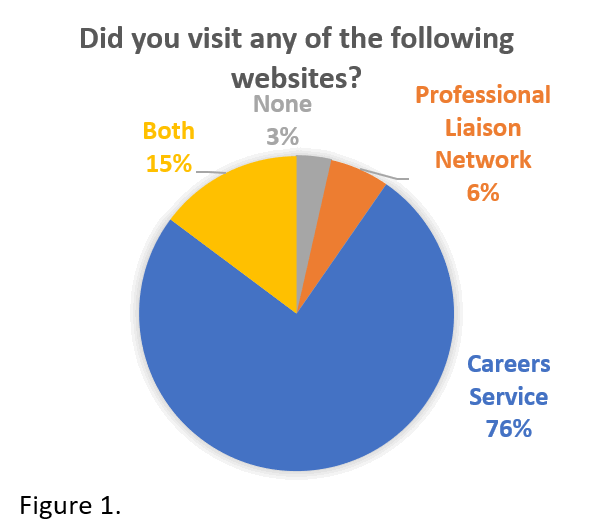
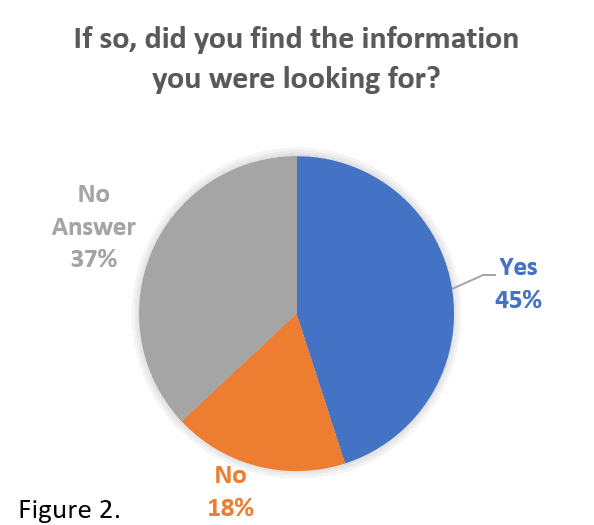
It should be noted that we are not aware of the type of information students were looking for in these websites, which means we might be overestimating student awareness of the employability initiatives. To cover that aspect, we asked students whether they engaged with those initiatives. Student responses (Figure 3) reveal that the vast majority of students had not engaged with these activities so far in their studies. The initiatives with the highest engagement were careers fairs (20.9%) and Economics talks (23.5%). Both types of activities are heavily advertised within the School, through newsletters, student societies and, in some cases, mentioned during lectures.
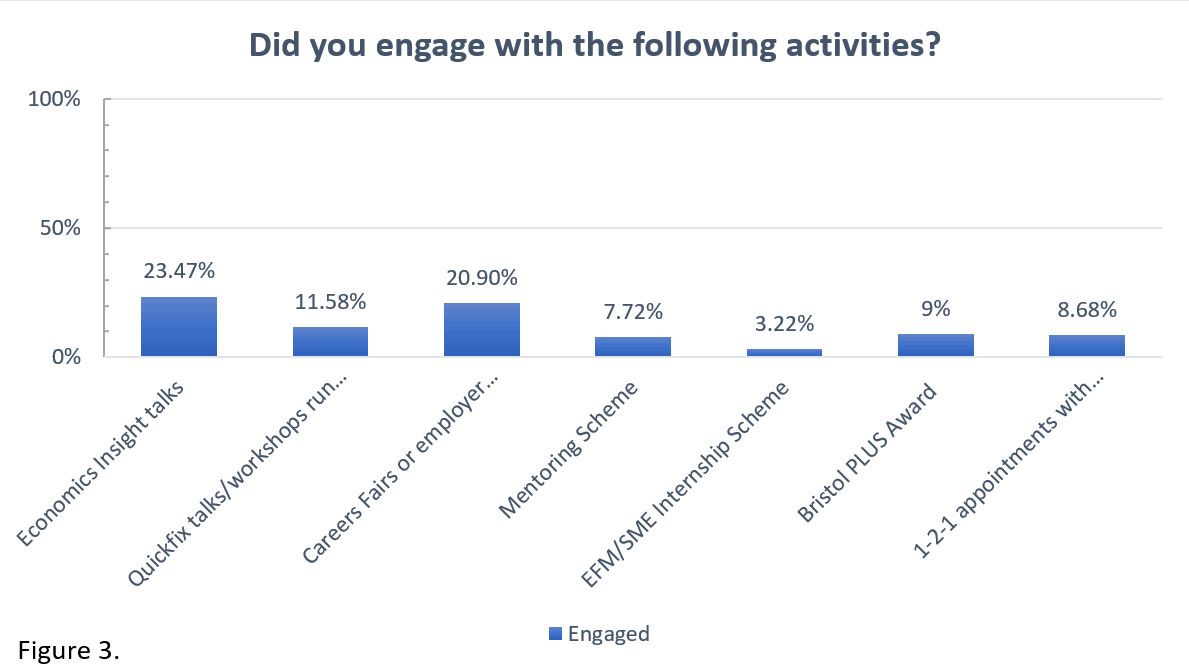
We consider this lack of engagement worrying but were already trying to improve it through the skills sessions. It does not necessarily imply awareness issues, but can also be attributed to students not considering these initiatives relevant to their needs. This was particularly important for us to clarify, as it would require us to redesign and change the focus of these initiatives. We have clear evidence that this is not the case (Figure 4), since more than 94% of students expressed a clear intention to engage with these activities. It would be necessary, however, to understand why students, even though they are interested, did not engage in the past. It should be noted that the vast majority of undergraduate students focus more on gaining work experience and exploring potential career pathways in their second year. This might be a key reason why we do not see greater past engagement.
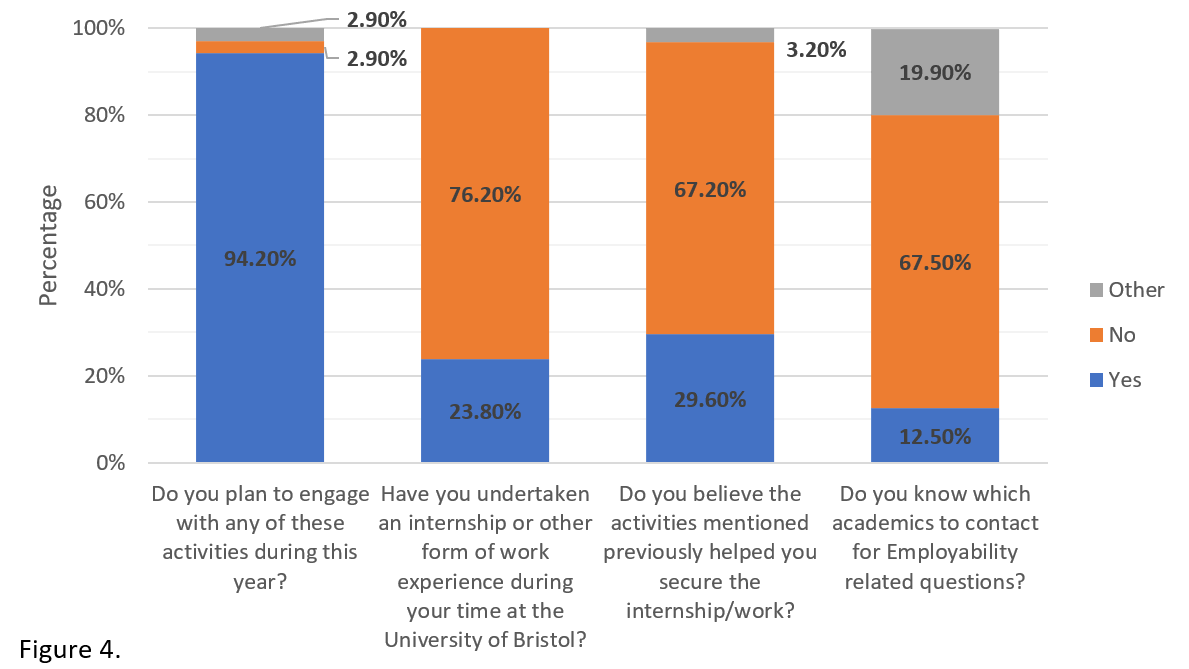 The remaining questions in Figure 4 focus on the acquisition of work experience. For many students, securing a placement or internship during their studies is key and they devote a lot of time and effort into applying. The School of Economics does not offer a Professional Placement Program (also known as year in industry), so securing internships and placements individually is a great, and often the main, way for our students to apply their knowledge and skills in practice. Less than one in four students already had some type of work experience in the beginning of their second year. From those, about half had full-time work experience (23 responses) while the remainder had part-time work experience (24 responses). Similar results were reported on whether the opportunity they took was paid (34 responses) or unpaid (36 responses). Additionally, 67% of students that gained work experience did not feel that the employability support available helped them secure this opportunity.
The remaining questions in Figure 4 focus on the acquisition of work experience. For many students, securing a placement or internship during their studies is key and they devote a lot of time and effort into applying. The School of Economics does not offer a Professional Placement Program (also known as year in industry), so securing internships and placements individually is a great, and often the main, way for our students to apply their knowledge and skills in practice. Less than one in four students already had some type of work experience in the beginning of their second year. From those, about half had full-time work experience (23 responses) while the remainder had part-time work experience (24 responses). Similar results were reported on whether the opportunity they took was paid (34 responses) or unpaid (36 responses). Additionally, 67% of students that gained work experience did not feel that the employability support available helped them secure this opportunity.
We interpret this as a potential gap. The majority of students reporting that the activities helped them secure an internship also requested help in preparing their applications and CVs. A second gap was identified on recognising academic staff as employment support. Two thirds of students were not aware of which academics they could approach for support and advice for employability questions. When we asked students the type of support they would like to receive, there was a wide range of answers such as writing CVs, information about potential career pathways, interview support and support in securing internships.
This questionnaire formed the basis of the skills sessions and allowed us to focus on specific topics that were raised by the students. Due to the pandemic and the limited in-person interaction with students it was important to increase our visibility, so that students would not feel isolated. We also wanted to reassure students that, for those interested, there will be regular communication for employability related initiatives and that despite the restrictions we were making all necessary adjustments to minimise distortion.
Skills session content and structure
To improve the tutoring system, in 2020, we introduced a new initiative for second year undergraduate students. For the first time, we conducted a set of three skills sessions per term that were timetabled in students’ and tutors’ calendars. In line with the Academic Personal Tutoring Policy at the University of Bristol, each session focused on a different topic such as employability, personal development or pastoral support. These sessions were optional, lasted approximately fifty minutes and, due to the pandemic, took place online. Students still had the opportunity to arrange individual meetings with their tutors.
The purpose of these sessions was to establish a regular point of contact between students and tutors and to create a closer relationship making it easier for students to approach their tutors and discuss any problems they might be facing. In the midst of the pandemic, this proved to be vital because in-person communication became extremely limited. It was also important to showcase the wide array of support tutors can provide to students, which was not entirely clear in the past. As a result, these sessions needed to be conducted by a larger than usual number of academics. The obvious issue was the need for coordination and homogeneity across tutors to ensure all students would have a similar experience. As part of our employability lead role, Dr Ahmed Pirzada and I designed and gathered the content for these sessions. Before each session, we would meet all tutors to discuss the material, explain how to run the session and answer any questions. These sessions proved valuable not only for the delivery of the content but it also allowed focus on themes that students and tutors considered useful and relevant at each point of the academic year.
The main topics covered during the six skills sessions were employability initiatives and the mentoring scheme, careers service support and CV writing, senior tutor and well-being support, aptitude tests, further studies, degree options and entrepreneurship. Each session consisted of different types of material, such as presentations containing useful information and links, recorded interviews from university staff on each session’s topic, interactive activities, job market updates and a list of initiatives and other opportunities taking place until the next session. Some of the topics that students requested were funding opportunities for further studies and changing career pathways. It should be mentioned that students appreciated having these topics addressed, even if they were not the ones making the requests. Tutors achieved a better level of communication with students and some of the sessions focused for the most part on student requests. This was particularly encouraging because, in other teaching-related activities, student participation was extremely limited but we managed to maintain good attendance throughout the academic year.
The sessions appeared in student calendars but tutors would also email students some days in advance of each session as a reminder, to provide the online session links and inform them of the session topics.
End of year findings
Towards the end of the academic year, a second questionnaire was distributed to students. The main purpose was to receive direct feedback, understand the level of student satisfaction, the perceived usefulness of these sessions and to make changes in line with the students’ suggestions and needs. The level of student engagement as reported by the tutors was approximately 50% of students. Depending on the topic covered during each session, the level of attendance varied. The completion of the questionnaire was optional but we shared the relevant links not only during the sessions but also via email and during main unit lectures to avoid bias issues.
This questionnaire was completed by 105 students and 91% of them reported attending at least half the sessions (Figure 5). More than 50% of students agreed that the sessions should remain in their current form, while fewer than 1% believed the sessions should be cancelled. Approximately 42% of students were in favour of maintaining the sessions but suggested changes in terms of their number or content (Figure 6).
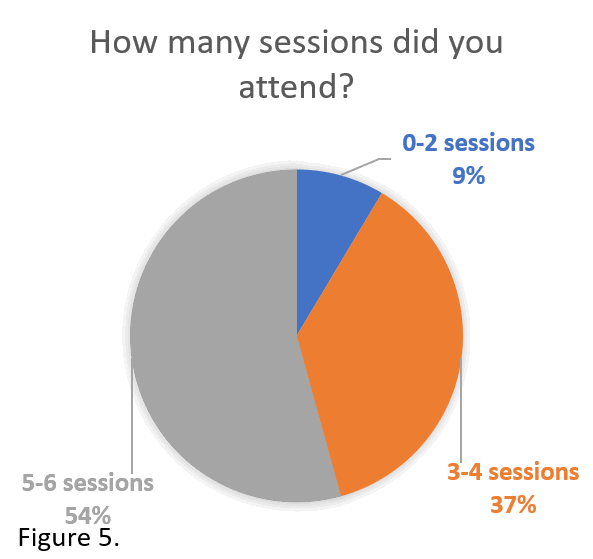
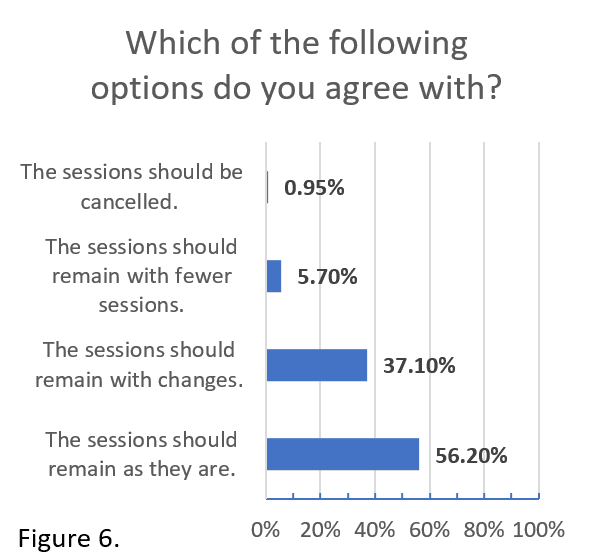
An important issue that arose while preparing these sessions was timing. At times, we felt that the students would have benefitted more by some sessions if they had been scheduled at different points during the academic term. This is partly due to restrictions related to university policies (e.g. these sessions cannot take place during student vacations or exam periods) but also due to COVID (e.g. deadlines were shifted or activities were cancelled). It was important to know if students would have preferred to have these sessions at different points during their studies. To our surprise, about 85% of students responded that they should be extended to more than one year, either in years 1 and 2 or years 2 and 3. It is evident from the response in the first question that students want longer-term employability support that expands over more than one year of their studies. An indirect observation is that the content matched the timing of students with respect to their degree progress and future aspirations as their studies progress. The students could have reported that the content was suitable for first year students, i.e. too basic, or not suitable to the needs of second or third year students. There were no such responses, which we treat as evidence of suitability.
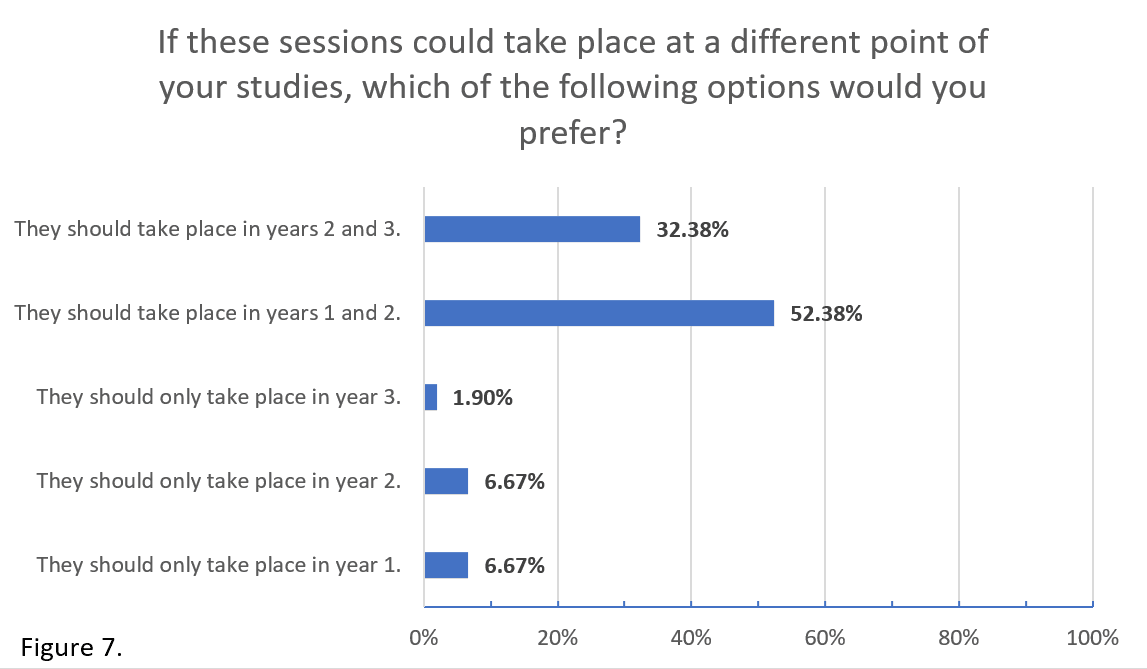
To better understand content delivery and the usefulness of the sessions, we explicitly asked a series of questions on the level and quality of information and level of contact students experienced (Figure 8). 82% found the content useful, 66% found the recorded interviews informative, and even though they do not consider the sessions to be particularly interactive amongst students (despite our best efforts), 72% found they were a good opportunity to be in contact with their personal tutors. This is a very encouraging result because one of the issues we were trying to address through these sessions was the limited communication between students and personal tutors.
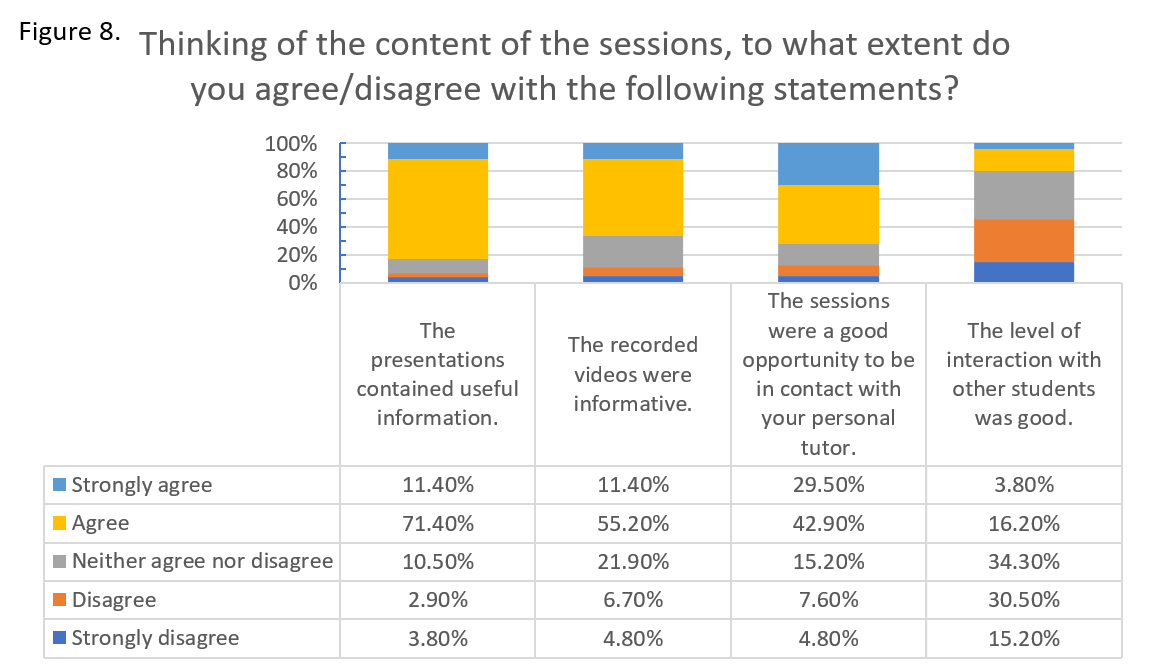
Another important aspect was whether the information we considered important enough to include in these sessions is also considered important and useful by students. Since this was our first, trial, year, we did not have past feedback on student needs and interests. We encouraged students to suggest topics of interest for future sessions but these topics were incorporated with the rest, not segregated. We wanted to check if there was a difference in the perceived usefulness of the topics proposed by students. Figure 9 summarises our findings. More than 50% of students rated each session as useful or very useful, apart from the session on wellbeing support (40%). The most successful were the sessions on further studies and alternative career pathways and on dissertations and entrepreneurship. Both sessions contained topics that were suggested by students which might have contributed positively to the responses.
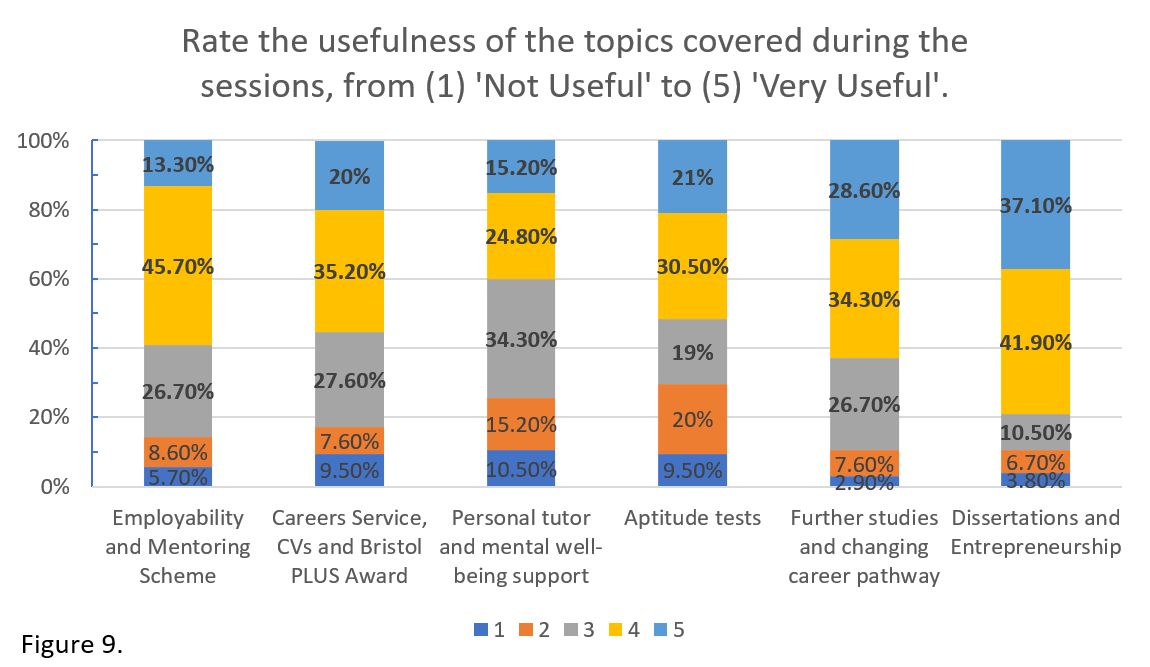
More than 83% of students felt that the selected topics were the most important (Figure 10) and that the order was appropriate. Combined with previous results, it is safe to conclude that students wanted the sessions to be extended throughout their studies because they felt the sessions contained useful content. We asked students to propose topics for future reference. The most frequent suggestion was more specialised and tailored support, such as entering specific career pathways or a more advanced level of information in topics that were covered but in less detail than some students would have liked.
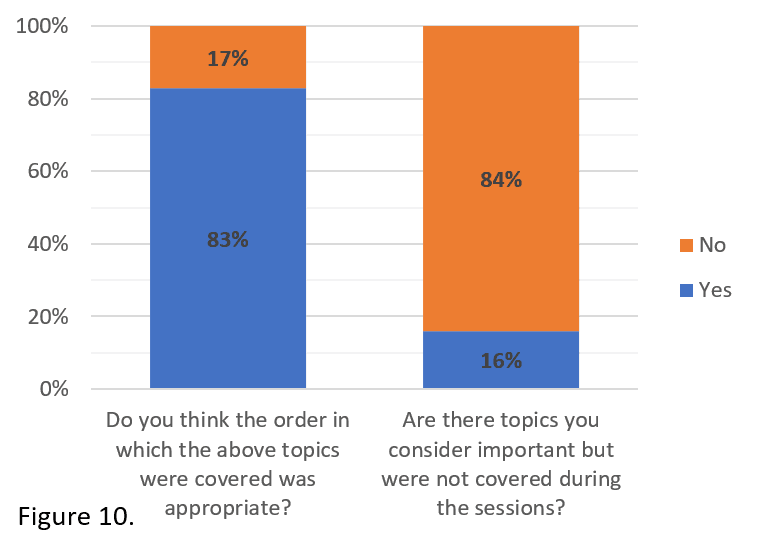
An important question in the first questionnaire was about the level of awareness and engagement with the School’s initiatives. Figure 11 shows evidence that there is a clear improvement in both aspects. Not only students expressed their intention to become involved, but they also became aware of the initiatives and selected those that were more appropriate to their needs. At least 52% of students were aware of each type of initiative and at least 34% engaged with each initiative. The only exception was the internship scheme but this is largely due to the limited number of opportunities available. The School of Economics had the largest amount of students expressing interest in participating in the scheme compared to other relevant Schools (i.e. of Finance and of Accounting and Management) whose students can also apply for the same opportunities, based on the job requirements.
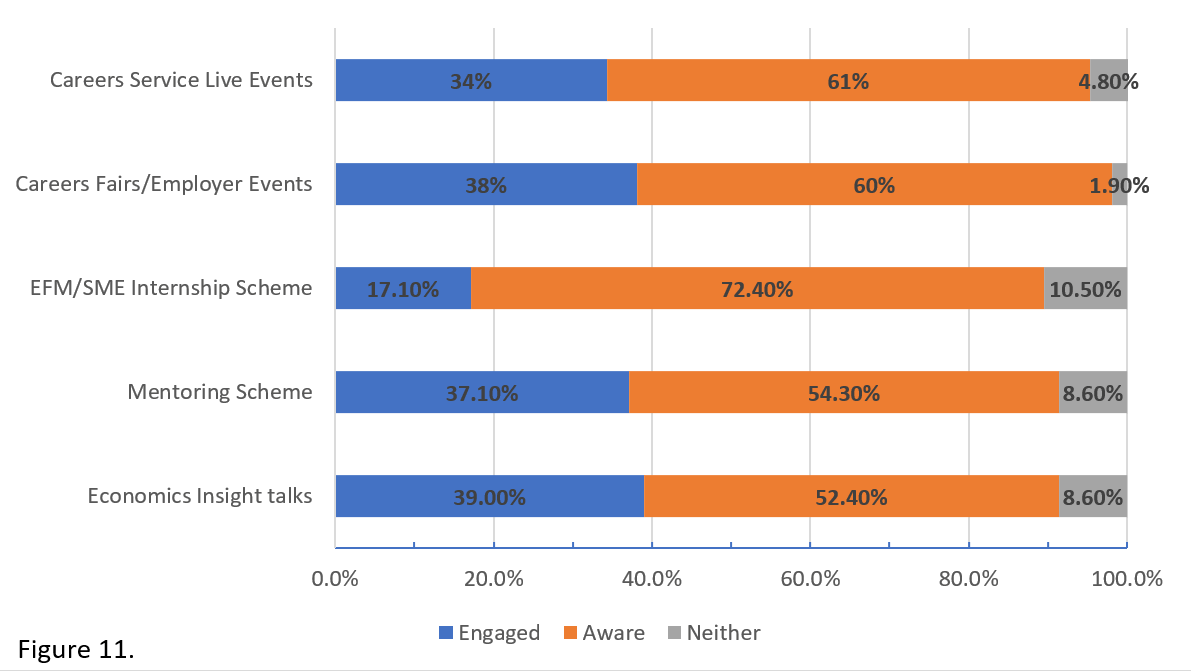
Roughly one third of our students secured an internship during their second year (Figure 12). It is worth mentioning that a further 10.5% of students were still waiting for the outcome of their applications. The pandemic has been especially harmful for placement and internship schemes, since many were cancelled or postponed indefinitely. With this in mind, many students decided to focus on acquiring other relevant accreditations, which was discussed during the skills sessions.
A key aim of the sessions is to make sure students are aware whom to contact throughout their studies if they need further support. More than 56% of students know whom to contact about personal tutoring and employability questions, which is a considerable improvement compared to the 12.5% in the beginning of the year. 73% of students reported they know where to find resources related to employability, while only 7% reported they already knew where to find them. Finally, 80% reported having a better understanding of the available support compared to the beginning of the academic year.
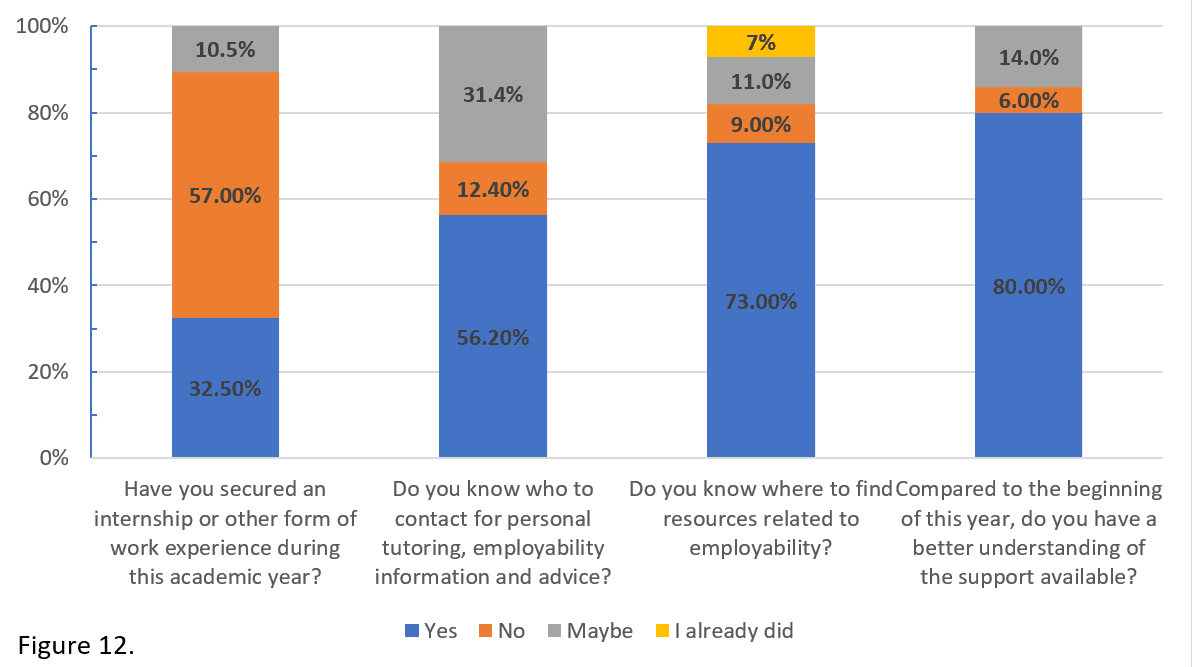
Conclusions and further action
The findings and feedback for this intervention have been very positive. The students reported a very high level of satisfaction and there is clear evidence of improvement in the level of understanding of available support. The School recognised the success and usefulness of these sessions and decided to expand them and provide more tailored support to our students. At the second stage, similar sessions will be introduced to first year undergraduate students and there will be discussions on the scope and feasibility of future expansion for final year undergraduate and postgraduate students. To improve the content of these sessions, the senior tutor team will be involved in addition to the employability leads. The two teams will cooperate, allowing the School to provide well-rounded support to students by offering specialised guidance in relevant topics. As a result, the number of sessions will be doubled and the timing of these sessions will be adjusted according to student feedback. Due to the uncertainty around the pandemic, the sessions will remain online but we are hoping to hold them in-person in the near future.
It is worth mentioning that the outcomes of this initiative have attracted great interest across the university and many department/schools are considering adopting this approach. Our next steps will be to research the expansion of this intervention and further investigate its effect on student experience and support. We aim to publish the results of the second stage in the near future.
↑ Top
